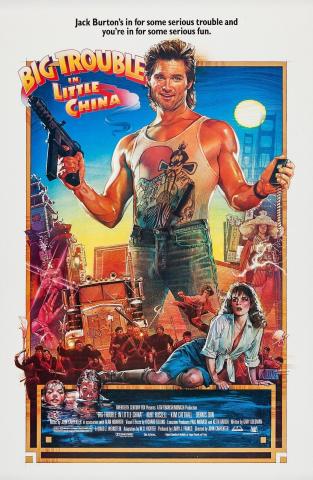The Enduring Popularity of BIG TROUBLE IN LITTLE CHINA

The following notes on John Carpenter's Big Trouble in Little China were written by Lori Lopez, Professor of Communication Arts and Director of the Asian American Studies Program at UW-Madison. Big Trouble in Little China screened at the Cinematheque on October 7 as part of the 1980s Fan Favorites Series and the 2023 Asian American Media Spotlight.
By Lori Lopez
John Carpenter’s 1986 film Big Trouble in Little China takes us into the mysterious underworld of San Francisco’s Chinatown for a wild ride of martial arts action, fantasy adventure, and self-aware comedy. Kurt Russell stars as Jack Burton, a loud-mouthed white truck driver who ends up embroiled in a zany quest to help his Chinese American friend Wang Chi (Dennis Dun) rescue his betrothed (Suzee Pai) from Chinatown villains before they can deplete her life force in exchange for immortality. It marked the fourth collaboration between John Carpenter and Kurt Russell, following the TV movie Elvis (1979), Escape from New York (1981), and The Thing (1982). While Big Trouble was originally seen as a commercial flop, grossing only $11 million off a $19 million budget, it has since become celebrated as a cult classic, beloved for its campy tone, exaggerated characters, snappy one-liners, and hybrid genre sensibilities.
In some ways, it’s an exercise in showcasing several of the most offensive tropes in Asian American representational history. Big baddie David Lo Pan (James Hong, in one of his most iconic roles) is the living embodiment of Orientalism and Yellow Peril, a Fu Manchu-type ready to dominate the universe with his mystical evil powers. The Asian men are preternaturally gifted at martial arts, and while co-lead Wang Chi is superior in fighting, he keeps turning for assistance to the bigger, brawnier white protagonist Jack Burton. The only prominent Asian woman is a beautiful China doll with almost no lines of dialogue, a damsel in distress who must be saved from her own culture so she can finally get married and live happily ever after in America. Then there’s the titular Chinatown itself, presented here as a seething den of iniquity, full of exotic secrets, bizarre creatures, and excessive violence.
While these stereotypes are undeniable, it would be a mistake to ignore the winking fun that the film is striving for. Russell’s Jack Burton may look like the physical embodiment of the 1980s action star but watching him bluster his way through Chinatown, it’s clear his bravado and self-assurance are wildly unearned. He’s completely useless in a fight, makes hilarious blunders that endanger his team, and even ends up knocking himself unconscious just as the final showdown begins. Burton’s outsider status is nothing but a detriment, and his incompetence ends up positioning his “sidekick” Wang as the true hero of the story. It only makes sense that as the film closes, Burton drives off alone in his truck without so much as a goodbye kiss from his love interest (Kim Cattrall), while Wang ends up with the girl of his dreams.
Moreover, Asian American audiences have long held a deep affection for the film. In 2015, the Asian American media arts organization Visual Communications hosted a reunion screening of the film in the Little Tokyo neighborhood of Los Angeles. In addition to screenwriter Gary Goldman and star James Hong, 10 cast members including Al Leong, Peter Kwong, Gerald Okamura, Jeff Imada, and Lia Chang joined a panel in fondly reminiscing about their work on the film. They reflected on how the film had premiered just after Michael Cimino’s controversial Year of the Dragon (1985), which Asian American advocacy organizations had protested as racist and anti-Asian for its stereotypical portrayals of Chinatown crime. In contrast, the Asian American cast and crew of Big Trouble genuinely seemed to believe that, despite the stereotypes, their film was all in good fun, and that they felt pride and ownership in their portrayals. Years later, they were still excited to celebrate the primarily Asian-cast film as the jumping off point for many Asian American careers in Hollywood, and as one of the highlights of the storied career of the legendary James Hong.
While today’s audiences are welcome to make up their own minds about just how well Big Trouble in Little China ultimately straddles the line between troubling and transgressive, its enduring popularity and cultural impact are a testament to the talents of not only the film’s director, but also of its primarily Asian American cast.
